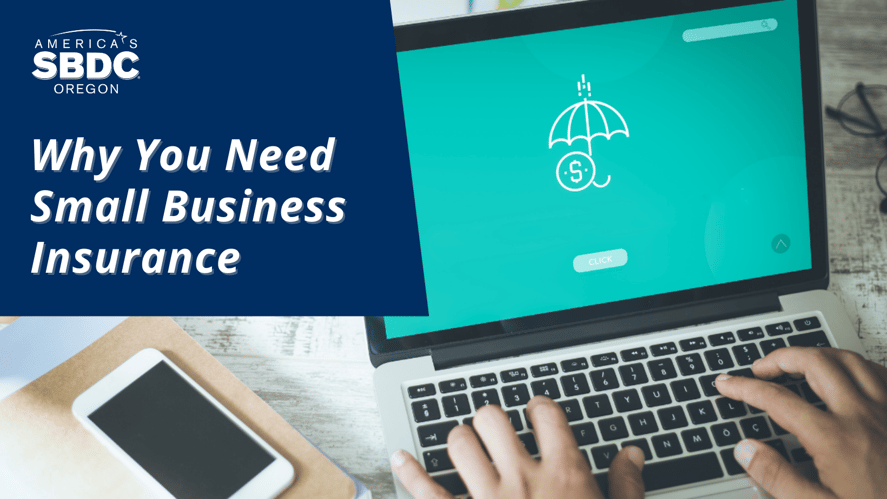
First published by the Oregon SBDC Network here.
Small business insurance, also commonly referred to as commercial insurance, is designed to protect the business you’ve invested your time, money, and effort into building. Having insurance assures small business owners that they’ll be safeguarded against claims and lawsuits.
Why Do You Need Small Business Insurance?
Business insurance is highly recommended for all businesses. In fact, it is required by law for certain professional fields, such as healthcare, which also requires professional liability coverage. This is also known as malpractice insurance. In other professions, a contract may require that businesses be insured.
Unfortunately, businesses can be sued for almost anything, even if they’ve done nothing wrong. For instance, if someone slips and falls in a place of business, or if a client feels that they were not provided the services committed to them, a business could find themselves facing an insurance claim or possible lawsuit.
Without the protection of insurance, a small business owner would likely have to pay out of pocket when facing insurance claims. Should your small business not have the resources to be self-insured or the capital to cover such claims, it could lead to business failure.
The good news is that business insurance may cover the majority of these expenses, including legal defense for the business owner. This is why small business insurance is an important and necessary investment to protect a business and its assets.
What Kind of Business Insurance Do You Need and How Much Does it Cost?
The business insurance a company needs depends on the type of business it is. Most businesses need general liability insurance. If you offer professional guidance, you may also need professional liability insurance. If you own equipment to operate your business, like computers or machinery, you may consider a business owner’s policy (BOP) which combines general liability with business property coverage. Small business insurance costs depend on the business type and size, the policy and coverages selected, and many other factors.
The 10 Most Common Types of Small Business Insurance
These are the top 10 types of insurance coverage to consider for your small business, some of which may be required by Oregon state law:
1. General liability insurance
General liability insurance helps protect businesses from claims relating to bodily injury or damage to someone else’s property. For example, if a customer gets injured in your store, this coverage may help to pay for their medical costs.
Many small business owners get a general liability policy that includes product liability insurance. This can protect your business against bodily injury or property damage claims caused by your company’s products.
2. Professional liability insurance
Professional liability insurance, also known as errors and omissions insurance or E&O insurance, can cover claims on mistakes made in the professional services your business provides. Doctors, accountants, lawyers, and architects are often targets for these types of claims.
This is because the errors made by these professionals end up being quite expensive for their clients to resolve. If a client or customer sues your business, professional liability insurance can help cover your legal costs.
3. Business income coverage
Business income coverage, also known as business interruption insurance, can help replace lost income if your business becomes unable to operate due to property damage caused by a fire, storm, or theft. For example, a florist whose flowers die after their refrigerator malfunctions may be able to recoup lost income with this type of insurance.
4. Commercial property insurance
Commercial property insurance, also called hazard insurance, can cover your owned or rented business space and the equipment used to conduct your business. For instance, if someone breaks into your office and steals your business computers, commercial property insurance can help cover the costs to replace this equipment.
5. Workers’ compensation insurance
Many states, including Oregon, require businesses with full-time or part-time employees to have workers’ compensation insurance. This kind of insurance can cover medical bills for on-the-job injuries and work-related illnesses and provides disability benefits to employees. Many policies include employers liability insurance, which may help to cover costs when an employee blames their employer’s negligence as the cause of their injury.
For business owners who do not have employees, you may need to self-insure for worker’s compensation depending on your industry. Be sure to address your individual needs with an insurance professional.
6. Commercial auto insurance
In Oregon, all business-owned vehicles must have a commercial auto insurance policy, which covers the cost of accidents involving work vehicles. Oregon has minimum requirements for auto liability insurance, which include:
- Bodily injury liability
- Property damage liability
- Uninsured motorist coverage
- Personal injury protection
The minimum requirements may not suffice, though, so be sure to get the right amount of coverage for your individual business needs. Trucking companies may need additional coverage to comply with state regulations.
If a business owner or their employees use their personal vehicles for work purposes, you may also consider hired and non-owned auto (HNOA) insurance, as personal auto policies usually exclude business use. This coverage can be added to commercial general liability insurance or business owner’s policies (BOPs).
7. Data breach insurance
Data breach insurance, also called cyber liability insurance, can help your business respond to a breach of personally identifiable information getting lost or stolen. It helps cover costs for actions such as notifying impacted customers or clients, running a public relations campaign to repair your business’s reputation, and/or offering credit monitoring services.
8. Commercial umbrella insurance
Commercial umbrella insurance extends the limits of certain liability policies that your business already has. For instance, if a claim’s cost exceeds your policy’s limit, a commercial umbrella policy can help cover the difference.
9. Employment practices liability insurance
Employment practices liability insurance, also referred to as employers’ liability insurance, helps cover the costs resulting from employment-related claims, such as discrimination, sexual harassment, and wrongful termination.
10. Business owner’s policy
A business owner’s policy (BOP) is one of the most common types of business insurance. It combines general liability insurance, commercial property insurance, and business income insurance into one policy.
Do I Need Insurance for My Oregon Small Business?
The short answer is yes. Most small businesses may need some type of coverage that protects against:
- Bodily injuries
- Property damage
- Car accidents
- Lawsuits
Your home and your business are likely your largest investments, and having the right business insurance is just as important as protecting your home with homeowners insurance. Without insurance, you risk financial losses or even the shutdown of your business.
How to Get Small Business Insurance
The following steps can help you find an insurance policy that best meets the needs of your business:
1. Conduct a risk assessment.
Determine what kind of accidents, natural disasters, or lawsuits could damage your business. Once you assess your risks, it can help you determine what aspects of your business need the most protection.
2. Find a licensed insurance agent.
Commercial insurance agents can help you find the coverage that best matches your business’s needs. Remember that insurance agents receive a commission from insurance companies they sell policies for, so it’s essential to find a licensed agent who keeps your best interests in mind. It’s recommended that you meet with your insurance agent on an annual basis to review your policies and find the right coverage as your business continues to evolve and grow.
3. Shop around.
Insurance quotes can vary significantly from one insurance provider and policy to the next. You should always compare the rates, terms, and benefits of various policies from multiple agents. If you choose not to work with a licensed insurance agent, it’s recommended that you get at least three business insurance quotes to find the best rate for the coverage you’re seeking.
4. Reevaluate each year.
The more your business grows, the bigger your liabilities become. If you have purchased or replaced equipment or expanded your operations, you’ll need to inform your insurance agent of these changes and how they may affect your coverage and insurance costs. Be sure to include this as part of your annual business plan review!
Need More Advice?
The PCC Small Business Development Center is here to support you with no-cost business advising and comprehensive business training programs. Get started by requesting your first no-cost business advising session here.



